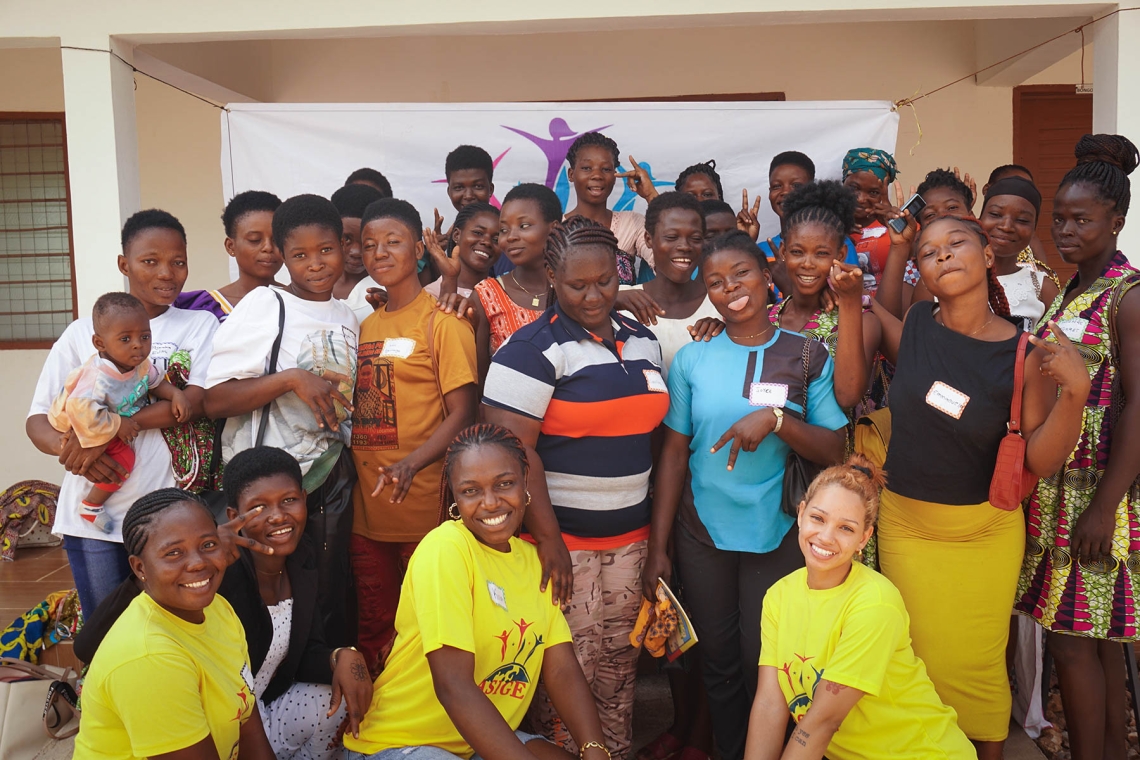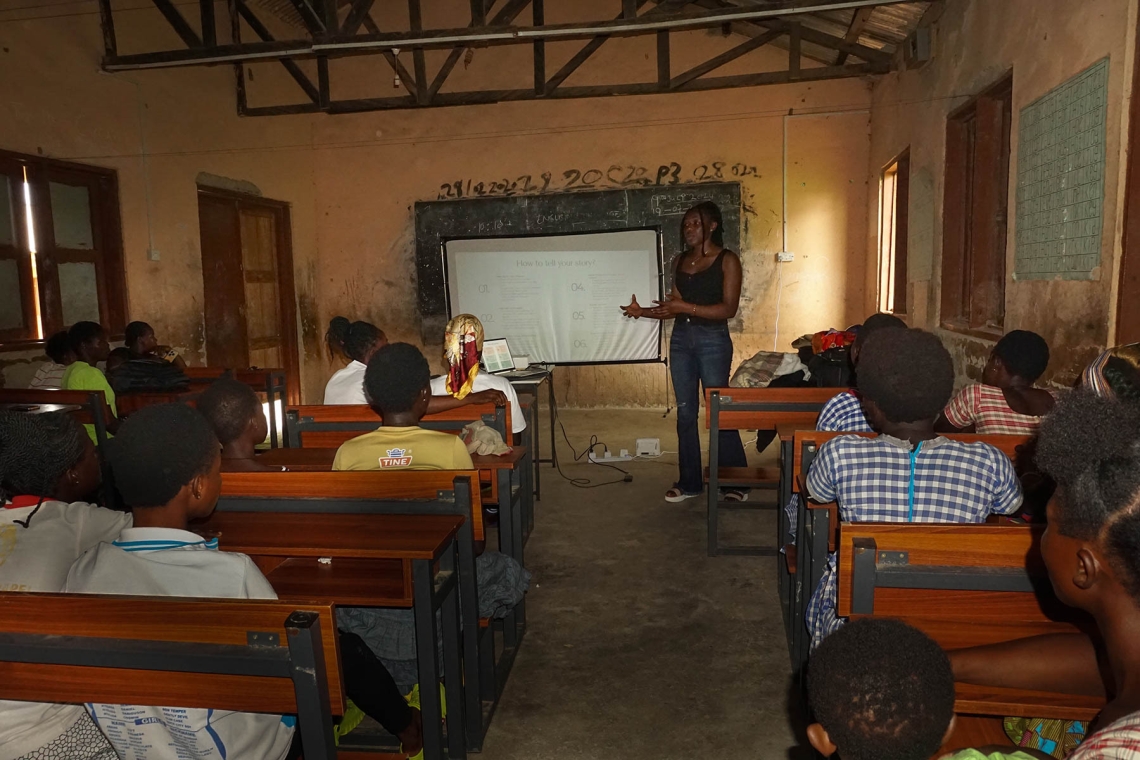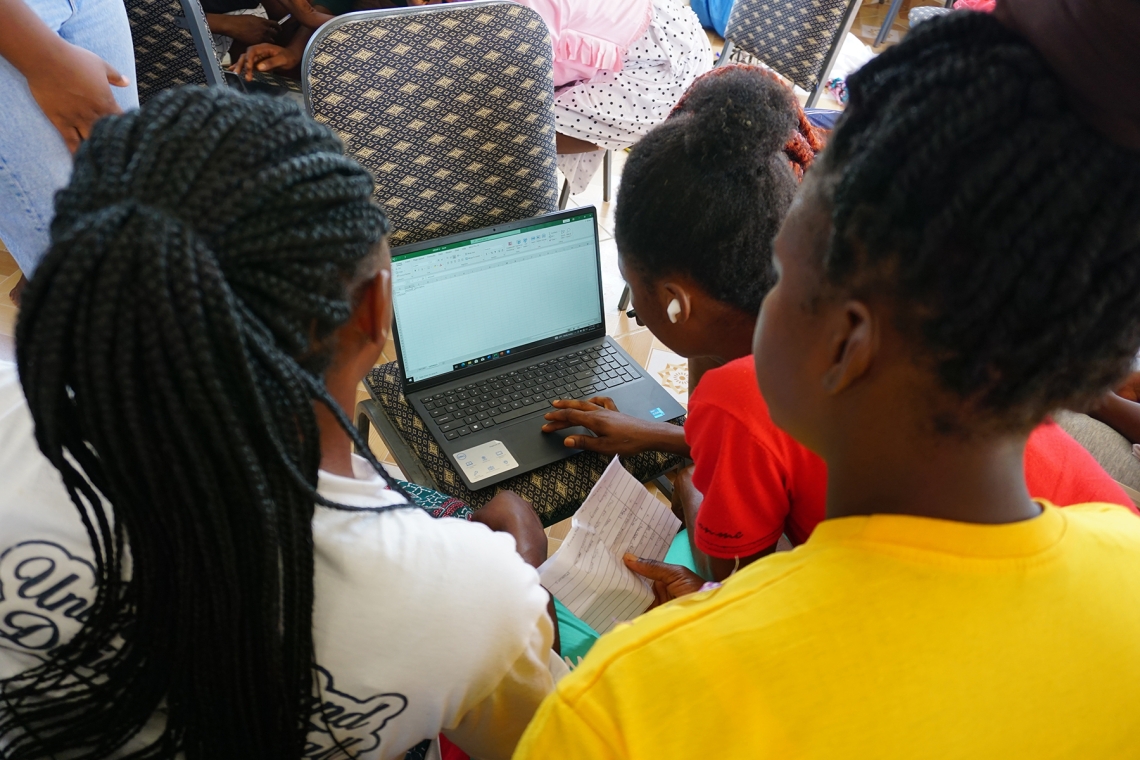Project Uplift Three W&L students partnered with an NGO in Ghana this summer to create a training program for aspiring female entrepreneurs.
“For us, the name of this project embodies the core mission and commitment to uplifting and empowering women in low-income areas by providing them with essential vocational skills that can lead to sustainable livelihoods.”
~ Valentina Lozano ’25
Valentina Lozano ’25, Aishwarya Vemagiri ’25 and Eltice Langmia ’25 started their Fall Term classes shortly after returning from a stint doing some of their own teaching. The three W&L students spent the month of August working with an NGO in Ghana to implement a vocational skills training program for young women without access to formal education. Through the program, they worked with 60 women from the Bolga, Sumbrungo, and Bongo regions and invited speakers from Ghana, Cameroon, and the United States.
In 2023, the leadership team of ASIGE (an acronym for Advocacy for Social Inclusion and Girls’ Education) connected with Vemagiri and Langmia during their Spring Term course “Creating Field Documentary on Human Rights in Ghana,” taught by Stephanie Sandberg, associate professor of theater. During the class’s visit to Ghana, students worked with ASIGE for two weeks, creating documentaries about the organization’s initiatives, which include reproductive health education, sanitary pad production, basket weaving and vocational skills training. During this experience, the students developed a deep appreciation for ASIGE’s work and began conversations with its leadership team about potential future collaborations.
After they returned to campus, Lozano joined the project, and the trio held several online meetings with the ASIGE team to discuss which of ASIGE’s priority areas could have the most significant impact. The group collectively decided to focus on a vocational skills training project for young individuals involved in various trades, including tailoring, weaving, hairdressing and welding. The group named it “Project Uplift — Vocation Skill Training for Sustainable Livelihoods.”
They successfully obtained a grant of $10,000 from the Center for International Education to complete their project and credit Jillian Murphy, assistant director of international education and study abroad coordinator, with helping guide their project proposal in a way that offered a sustainable and beneficial product. The group began creating a program schedule to be implemented in August of 2024 that would appeal to women interested in starting small-scale businesses related to traditional crafts, fashion and personal services, leveraging the vocational skills they acquired through this and other training programs offered through ASIGE.
Vemagiri could not travel to Ghana in August with Lozano and Langmia due to funding constraints; the group realized the available funding was better suited to support two people traveling to Ghana rather than all three and chose to allocate more of their award toward the in-person activities and resources for the women in Ghana. Vemagiri worked remotely to support the project while Lozano and Langmia were in Ghana creating qualitative and quantitative questionnaires to assess the effectiveness of the workshops and gather feedback from the participants, providing remote support for the computer and financial literacy workshops, and helped to adapt the teaching methods and content of each workshop to be more culturally relevant and accessible for the participants through pre- and post-workshop tracking.
“The world is increasingly interconnected and technologically advanced, and today’s work landscape relies heavily on data,” Vemagiri said. “Our project was no different. Tracking our initiatives before and after implementation allowed us to identify the most impactful workshops and resources. This benefits ASIGE and us in planning future programs and collaborations and enhances our ability to implement global initiatives effectively.”
Dorcas Apoore, founder and CEO of ASIGE, said the students played a pivotal role and made a remarkable contribution to the organization during their month of onsite programs.
“They provided essential technical equipment, such as laptops, projectors and Wi-Fi devices, enrolled three additional girls in the tailoring program, and supplied learning materials to empower these young women to complete their training and eventually become entrepreneurs,” Dorcas said. The students took the initiative to conduct a series of workshops organized into a weekly schedule, grouping the participants by area of interest. Workshop participants explored goal setting, strategic planning and leveraging technology and digital tools for business through social media platforms, among other topics. Apoore said the students explored each topic deeply and made the material accessible.
“Our organization greatly benefited from working with Valentina, Eltice and Aishwarya,” Apoore said. “The impact of Project Uplift is long-lasting, as the girls enrolled in the tailoring program will soon graduate to become entrepreneurs themselves, passing on their skills to others and creating a ripple effect that empowers more women to achieve financial independence. Some graduates have already started their own businesses, using platforms like Facebook and TikTok to showcase their products and reach wider audiences. This project has been transformative, creating a profound and lasting impact on ASIGE and the communities we serve now and in the future.”
Lozano said the group learned along with the women involved with their workshop series and were thrilled to see the results of their work.
“We did not only see an improvement in terms of knowledge but so much confidence, personal growth and empowerment,” Lozano said. “A lot of the participants came with their babies. We witnessed them being mothers and being themselves, trying to start their own businesses and become independent women.”
The students invited guest speakers from Ghana and Cameroon to share their experiences starting and sustaining businesses. The workshops were designed to be fun and culturally relevant, so the group also incorporated activities like dancing and games. The group credits Molly Steele, dean of career and professional development, for advising the group on making the workshops more interactive and engaging.
“We wanted them to know we were there to listen to each other, and I think that’s also why they felt confident opening up to us,” Lozano said, “because they knew that they were talking to women that, to some extent, could relate to where they were coming from.”
“They are incredible young individuals, eager to learn and share their knowledge to make a positive impact,” Apoore said. “Collaborating with them was a phenomenal experience, and we would gladly welcome the opportunity to work with them again. The project also allowed them to step outside the classroom and engage in real-life situations. Through this experience, they developed a stronger belief in their ability to create meaningful societal change. They also recognized the importance of collaboration, understanding that partnership is essential for fostering growth and achieving greater impact.”
The students said their experience has already had an immeasurable impact on their dreams for their futures.
“I want to become a policy consultant at some point, specifically for NGOs working in the Global South,” said Lozano, a native of Medellin, Colombia. “After coming to the United States, I started to value my role as a woman and as someone who can help and connect with others. This project has helped me realize the importance of working on the ground and getting to know communities you want to help.”
Langmia plans to pursue graduate studies in drug development research in graduate school and said working with ASIGE gave her firsthand insight into the challenges women in rural communities face in accessing formal education and health care.
“Seeing those obstacles up close has inspired me to pursue research that advances therapeutic solutions and ensures that the innovations reach the people who need them most,” Langmia said.
Vemagiri plans to work in biomedical or fertility research immediately after graduation before attending medical school to become an OB-GYN.
“My summer experience with ASIGE provided me with skills that go beyond traditional learning,” Vemagiri said, “learning how to get people to trust you, communicating to achieve a goal with people who don’t speak the same language as you, teaching effectively by breaking down our Westernized ways of learning and starting from the ground up in a whole different learning schema. These are inherently valuable soft skills I will value throughout my career, and I am deeply grateful to ASIGE and the women we supported for this transformative experience.”
The group hopes that the future holds future collaborations and connections with ASIGE. While they do not have immediate plans to return to Ghana, they said this summer was truly fulfilling in terms of what they accomplished and how they did so as a team.
“Ultimately, we connected because we all came from low-income communities,” said Lozano. “We’re women of color, and we have struggled financially at some point, and so having been able to be in a position where we can help other women meant a lot to us.”
 Langmia and Lozano pose with one of their ASIGE workshop groups.
Langmia and Lozano pose with one of their ASIGE workshop groups. Workshop participants covered topics such as social media marketing and creating a brand for their businesses.
Workshop participants covered topics such as social media marketing and creating a brand for their businesses. Workshop participants collaborate during a breakout session.
Workshop participants collaborate during a breakout session.
You must be logged in to post a comment.